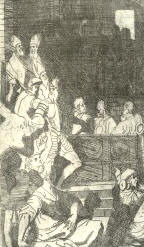 Stephen was a Roman, he entered the ranks of the clergy and
became cardinal-priest of Sts. Silvester and Martin. He was elected pope on July
14, 939. A protégé of Prince Alberic, Stephen had little to do with ruling the
Papal States, but he did make his influence felt in France.
Stephen was a Roman, he entered the ranks of the clergy and
became cardinal-priest of Sts. Silvester and Martin. He was elected pope on July
14, 939. A protégé of Prince Alberic, Stephen had little to do with ruling the
Papal States, but he did make his influence felt in France.
It is interesting to note that at a time when their temporal
power was reduced to nothing, the popes could still exercise so much influence
for peace. What happened was this. Louis, the young son of Charles the Simple,
was called back to France from England by the great lords. This not unworthy
descendant of Charlemagne, however, actually tried to rule France. When the
lords saw this, they plotted, intrigued, and rebelled against Louis. And soon
they were pressing him hard. Pope Stephen now intervened. He sent a legate named
Damasus on a peacemaking mission. The result was that the French bishops,
assembled in synod, tried to persuade Hugh, duke of Francia, to submit
peacefully to his monarch. In vain. Hugh continued to make life miserable for
young Louis. Then Stephen took two measures, one conciliatory, the other
threatening. He granted the pallium to Hugh's nephew, the boy archbishop of
Rheims. He told the nobles that if by Christmas 942 they had not sent him envoys
to assure him of their submission to their lawful king, they would be
excommunicated.
This threat bore fruit; the feudal opposition died down a little
and some of the pressure was lifted off King Louis. The same year, 942, Rome
itself was again besieged by Hugh of Provence, and again St. Odo, abbot of
Cluny, intervened to bring peace. Stephen IX died toward the end of October,
942.
Excerpted from "Popes
Through the Ages" by Joseph Brusher, S.J.

